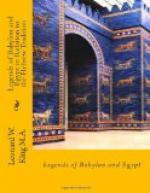But the people with whose traditions we are ultimately concerned are the Hebrews. In the first series of Schweich Lectures, delivered in the year 1908, the late Canon Driver showed how the literature of Assyria and Babylon had thrown light upon Hebrew traditions concerning the origin and early history of the world. The majority of the cuneiform documents, on which he based his comparison, date from a period no earlier than the seventh century B.C., and yet it was clear that the texts themselves, in some form or other, must have descended from a remote antiquity. He concluded his brief reference to the Creation and Deluge Tablets with these words: “The Babylonian narratives are both polytheistic, while the corresponding biblical narratives (Gen. i and vi-xi) are made the vehicle of a pure and exalted monotheism; but in spite of this fundamental difference, and also variations in detail, the resemblances are such as to leave no doubt that the Hebrew cosmogony and the Hebrew story of the Deluge are both derived ultimately from the same original as the Babylonian narratives, only transformed by the magic touch of Israel’s religion, and infused by it with a new spirit."(1) Among the recently published documents from Nippur we have at last recovered one at least of those primitive originals from which the Babylonian accounts were derived, while others prove the existence of variant stories of the world’s origin and early history which have not survived in the later cuneiform texts. In some of these early Sumerian records we may trace a faint but remarkable parallel with the Hebrew traditions of man’s history between his Creation and the Flood. It will be our task, then, to examine the relations which the Hebrew narratives bear both to the early Sumerian and to the later Babylonian Versions, and to ascertain how far the new discoveries support or modify current views with regard to the contents of those early chapters of Genesis.
(1) Driver, Modern
Research as illustrating the Bible (The
Schweich Lectures, 1908),
p. 23.
I need not remind you that Genesis is the book of Hebrew origins, and that its contents mark it off to some extent from the other books of the Hebrew Bible. The object of the Pentateuch and the Book of Joshua is to describe in their origin the fundamental institutions of the national faith and to trace from the earliest times the course of events which led to the Hebrew settlement in Palestine. Of this national history the Book of Genesis forms the introductory section. Four centuries of complete silence lie between its close and the beginning of Exodus, where we enter on the history of a nation as contrasted with that of a family.(1) While Exodus and the succeeding books contain national traditions, Genesis is largely made up of individual biography. Chapters xii-l are concerned with the immediate ancestors of the Hebrew race, beginning with Abram’s migration into Canaan and closing with Joseph’s death in Egypt.




